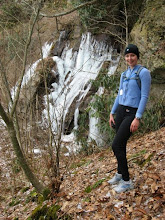 People often ask me what it's like being a resident.
People often ask me what it's like being a resident.It's remarkably similar to distance running. The beginning of a run is always painful, as is coming to the hospital at pre-dawn and waking up one's patients. Once awake, they tell me their woes from the last 24 hours and I review their labs and X-Rays. At 8am we convene as a group and discuss new patients. During this time, the pages begin and occur about every 15-30 minutes for the rest of the day.
Team rounds are a bit like the one hour mark during a run. This is when I desperately want to stop but unfortunately things are just getting started. Time for a power bar (coffee). I try to stay sharp to answer questions but dissociation begins to deal with the pain. We finish rounds just before noon and I have a few minutes to complete discharges and write orders before noon lecture.
 Noon lecture is like an aid station. We sit and eat, getting paged every few minutes to ensure indigestion, and listen to a lecture about neurology. By the time it is over, I have a list of things I need to accomplish before new patients start arriving. This is the sweet spot in the run where I am totally focused and feel no pain. I race back to the workroom and hammer out discharge summaries, page other physicians, and do other forms of scutwork. Scutwork is a nebulous term depicting the daily tasks required to take care of inpatients. Examples include ordering medications, placing consults with other services, reviewing MRIs with neuroradiologists, performing spinal taps, and speaking with patients and family members. Residents are often lovingly referred to as scut monkeys because of their endless scribbled lists of tasks and checkboxes. I find nothing so gratifying as checking little boxes as I complete my scutwork for the day.
Noon lecture is like an aid station. We sit and eat, getting paged every few minutes to ensure indigestion, and listen to a lecture about neurology. By the time it is over, I have a list of things I need to accomplish before new patients start arriving. This is the sweet spot in the run where I am totally focused and feel no pain. I race back to the workroom and hammer out discharge summaries, page other physicians, and do other forms of scutwork. Scutwork is a nebulous term depicting the daily tasks required to take care of inpatients. Examples include ordering medications, placing consults with other services, reviewing MRIs with neuroradiologists, performing spinal taps, and speaking with patients and family members. Residents are often lovingly referred to as scut monkeys because of their endless scribbled lists of tasks and checkboxes. I find nothing so gratifying as checking little boxes as I complete my scutwork for the day.In the mid-afternoon new patients file into the hospital. The local Dartmouth elite are recognizable by their fair trade herbal tea and down pillows with satin covers. They are Ivy League and command respect. They expect immediate service, and I am experiencing another bonk. I sneak into the second aid station (the call rooms) and make a peanut butter and jelly sandwich. Then I keep running, although the pace slows considerably. Pain returns and dissociation becomes the norm.
The finish line is elusive and depends upon how many admissions we have and whether I am on call for the night. On call is the ultra-marathon version of neurology where one stays overnight and repeats the above over and over until noon the next day. A regular day ends between 5 and 6pm with enough time to exercise, eat, and prepare for another day. Welcome to residency, I hope you trained for this.


No comments:
Post a Comment